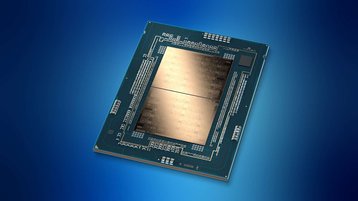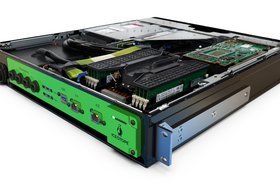Intel has launched its 5th-generation Xeon Scalable processors, describing the portfolio of products as “the best CPU for AI” at the company’s AI Everywhere event in New York.
Since AI exploded into the mainstream in late 2022, chip companies such as Intel, AMD, and Nvidia have been scrabbling to produce products that support the massive compute power required by AI workloads.
Intel only released the fourth generation of its Intel Xeon processors in January 2023 but, in an effort to keep pace with its competitors, has now unveiled the fifth generation of the chips, also known by its code name Emerald Rapids.
These new processors offer a 21 percent average compute performance gain and 16 percent better memory speeds than the previous generation of Xeon processors, Sapphire Rapids, enabling 36 percent higher average performance per watt across a range of customer workloads - Intel claims. This will allow users to undertake processor-intensive tasks while using less overall power, with Intel describing them as their most sustainable data center processors to date.
According to Intel, Xeon is also the only mainstream data center processor with built-in AI acceleration, delivering up to 42 percent higher inference and fine-tuning on models as large as 20 billion parameters, without the need for additional accelerators.
The new chips can contain up to 64 cores and have an L3 cache of 320MB, over double the size of the previous generation’s L3 cache of 112.5MB. By combining this larger cache with a simpler chiplet architecture, Intel says this new generation of Xeon processors provides a 1.21× performance gain over its previous offering.
However, while this is the highest number of cores currently available in an Xeon processor, it's a milestone that other chip designers, including AMD, have already surpassed.
The company also provided an update on its Gaudi3 AI accelerator, which is expected to be available in 2024. Intel’s Gaudi3 is set to directly compete with Nvidia’s H100 and AMD’s recently announced MI300X GPUs. Intel’s Gaudi processors are designed specifically for AI training and are produced by Habana Labs, which Intel purchased in 2019 for $2 billion.
At the event, Intel provided very few details about the technical specifications of Gaudi3 but the company did say that the accelerator will offer four times higher BF16 performance, two times faster networking performance, and bandwidth that will be one and a half times higher than Gaudi2.
The Gaudi2 processor was launched in 2022, and is being used in conjunction with Xeon processors to build an AI supercomputer that Intel is building for Stability AI.
“We’ve been seeing the excitement with generative AI, the star of the show for 2023,” Intel CEO Pat Gelsinger said at the AI Everywhere event.
For the consumer market, Intel also unveiled its new Intel Core Ultra chips, designed for AI-powered laptops and computers. Built on 7nm chips, the company said the Core Ultra includes more powerful gaming and graphics capabilities.
“We think the AI PC will be the star of the show for the upcoming year," Gelsinger said.
Both the Xeon processors and Core Ultra chips include Intel’s first client on-chip AI accelerator, the neural processing unit (NPU), which enables AI programs to run faster. In the case of the Intel Core Ultra, the NPU allows the chip to achieve a 2.5 times better power efficiency for AI acceleration than Intel’s previous offering.




